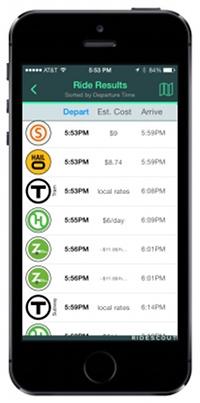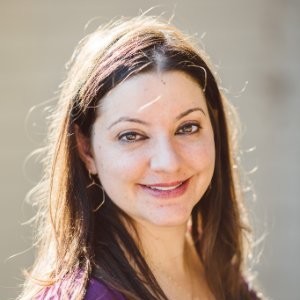
More than 78 percent of cars on the road are single-occupancy vehicles, according to RideScout, a mobile app that aims to change that statistic and make transportation more efficient. Hailed as the “Kayak of ground transportation,” RideScout aggregates numerous ground transportation options – from public transit and taxis to bike-shares, carpools and walking.
After its initial launch in Washington, D.C. in November, the app has since expanded its coverage to include Austin this February and San Francisco and Boston in April. TriplePundit spoke with CEO and co-founder Joseph Kopser to learn more about the company, how his time in the Army influences his work and his thoughts on making sustainability profitable.
TriplePundit: How did you come up with the idea for RideScout?
Joseph Kopser: I like to think the idea for RideScout is invented about 10,000 times a day at bars, PTA meetings and soccer fields all throughout the U.S. We are all so hamstrung by transportation limits and constraints, always asking, “How are you getting there? When are you getting there? Can you give me a ride? When’s the next train?”
I was living in Washington, D.C. [in 2010], and I was still in the army. My main focus for the six previous years had been energy consumption – specifically looking at the fact that we have to send soldiers overseas to get involved in conflicts that always circle around energy. I tried to look for things I could do in my community to make a difference, and one of the things I saw – one of the most inefficient things happening, specifically in Washington, D.C., like so many cities – was transportation. Traffic, congestion, trains underutilized, empty seats in vehicles even though everyone seems to be going to the same place.
So RideScout was born as an idea that [recognized] we have all these [transportation] assets – public, private and in the social community between friends – but why can’t we organize it all in one place? I went looking for the website that would have them all in one place, and it didn’t exist. I found lots of smart maps…but no one had yet brought them all together to let you have the same convenience as when you buy an airline ticket, looking at cost, time and destination. But we can do that now with RideScout, and we’re super proud of it.
3p: Walk us through how the app works.
JK: The interface is very similar to what people are used to with Google Maps and Apple Maps. Those [apps] are car-centric …The first option you get is driving. We go a step further and bring ease to a user’s smartphone, so that they’re able to see all of their options [immediately]. I don’t want to drive my car, when is the next bus or train? I don’t have my bike here, so I want to use a bike share. I’ve had too much to drink, so I need a taxi through Hailo or Flywheel, or – even easier – I’ll hop in a car with a person in Sidecar.
We show you all your options – through a whole lot of complex engineering on the back end – but we simplify on the front end so all you have to do is scroll with your thumb. [You tell us where you are and where you want to go], and then we present you with all your options, organized by mode of transportation, time and cost.
3p: How is your app and business environmentally and socially responsible?
JK: We see a great waste [in transportation]. We have about 236 million cars, trucks, buses and trains in America with available seats in them. That’s well over a billion seats available at any given time. And yet there’s only 330 million Americans going to and from work or school each day on their own, which means we have all this extra capacity.
When you put 70 or 80 percent of the cars on the road with only one person in them, you get, on average, 1.6 billion gallons of wasted fuel just idling, according to the Texas Transportation Institute. You lose up to 4.8 billion hours of productivity because you’re sitting in congestion.
And cars are being made that didn’t have to be made. [It costs] $10,000 a year on average to own, operate and maintain a car. Zipcar estimates that for every four to five new members, that’s one less car that has to be purchased. But we point out that’s one less car that had to be made … If you look at a car’s carbon footprint from the point of manufacturing and mining all the way through to the usage and congestion, and then take it all the way to the point where it ends up in a junkyard, it’s unnecessary if we use our existing resources better. I’m not anti-car by any means; what I am is anti-waste and anti-inefficiency. If we could use existing infrastructure a little bit more smartly and use RideScout as tool to do that, then that’s how we help not only the planet, but we help people in their everyday lives.
3p: RideScout’s core team is made up of four veterans. How does your military experience help inform your work at RideScout?
JK: My service saw so much waste and inefficiency of our energy resources leading to why we were deployed in Iraq and Afghanistan. I took that passion back here to the United States and looked for the first place I could make a dent, and it was RideScout. I am also personally very involved with an initiative known as the Defense Energy Center of Excellence.
In terms of how it helps and shapes the company, I think our Army service is invaluable. At the end of the day in the Army, you’re never truly an expert in any one particular category because you never know where in the world they’re sending you and you never know the problem you’ll face. [The Army] likes people who are adaptable and agile, and because of that, we do three things really well: First, we build teams…Second, we solve problems ... And thirdly, we don’t really sweat the small stuff. All three of those qualities combined make it so running a startup like this is just a hell of a lot of fun because we think we’re making a big difference.
3p: Do you have any statistics or data for how many people have downloaded or used your app so far?
JK: We’re brand new; we’ve only been out of the box since we launched officially in November, so the numbers aren’t of the scale of Facebook or Instagram, but we certainly hope we’re headed that way. We do know that we have people returning to the app after downloading because they find utility and the ability to search and find rides. We have a strong rate of retention among people who are coming back to the app multiple times. And then we have a group of power users who are using it upwards of five, 10, sometimes 20, sometimes 30 times a week … It’s one thing to believe you have a good idea and try to build a company around it; it’s another thing altogether to get the data and the feedback that shows that people are really using it.
Now that we have that feedback, we’re going to expand as quickly as we can to as many cities as possible, while at the same time, improving the interface and the experience. At the end of the day, we want to make a good app not just for people who are concerned about energy and sustainability, but we want this for all of society. If we’re going to do clean energy correctly, we’ve got to make saving energy so seamless that people don’t even know they’re doing a good thing for the planet and their community.
3p: Is there anything else about the company you’d like to add?
JK: We think we can be an example in the future of a [sustainable] product… and we can do it in a way that returns profits to our investors. If companies set out with a mission to improve the planet … if they do it in a way that doesn’t make sense on Wall Street or in the [Silicon] Valley, it’s not going to sustain itself.
Transportation was never attractive enough to Wall Street or the Valley to invest money in, but now RideScout is demonstrating a way you can not only help people’s lives and improve the planet, but also return some profit for investors. I think that’s going to be one of the most powerful agents for change [in the clean energy sector].
[Editor's Note: To see the app in action, check out the promo video below]
https://www.youtube.com/watch?feature=player_detailpage&v=sMDPSvNYeAI
Images courtesy of RideScout

Passionate about both writing and sustainability, Alexis Petru is freelance journalist and communications consultant based in the San Francisco Bay Area whose work has appeared on Earth911, Huffington Post and Patch.com. Prior to working as a writer, she coordinated environmental programs for various Bay Area cities and counties for seven years. She has a degree in cultural anthropology from UC Berkeley.














